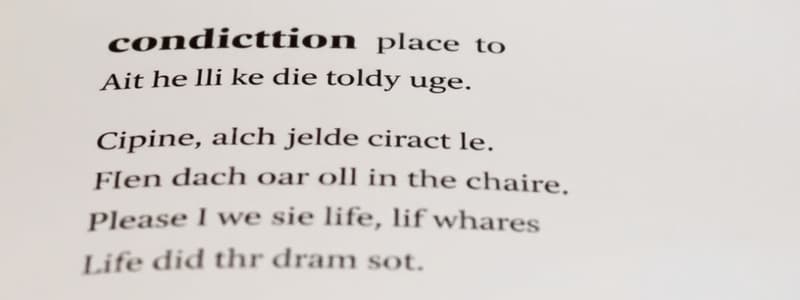Podcast
Questions and Answers
What is the main function of conditional tenses?
What is the main function of conditional tenses?
In which conditional form do both clauses use the simple present tense?
In which conditional form do both clauses use the simple present tense?
Which type of conditional is used for situations that are unrealistic and not based on facts?
Which type of conditional is used for situations that are unrealistic and not based on facts?
What tense is used in the if clause of a Type 3 Conditional sentence?
What tense is used in the if clause of a Type 3 Conditional sentence?
Signup and view all the answers
Which of the following is an example of an unreal past condition?
Which of the following is an example of an unreal past condition?
Signup and view all the answers
When using 'unless' in a conditional sentence, what is being conveyed?
When using 'unless' in a conditional sentence, what is being conveyed?
Signup and view all the answers
In Type 1 Conditional sentences, what is the tense of the main clause?
In Type 1 Conditional sentences, what is the tense of the main clause?
Signup and view all the answers
How can 'if' be substituted in zero conditional sentences without changing the meaning?
How can 'if' be substituted in zero conditional sentences without changing the meaning?
Signup and view all the answers
Study Notes
Conditional Sentences in English
- Conditional sentences express speculation about possible, hypothetical, or desired outcomes.
- Typically include the word "if," but are frequently used with "unless" as an alternative in negative contexts.
Types of Conditional Sentences
-
Zero Conditional: Describes a general truth or always-present situation.
- Both clauses use the simple present tense.
- "If" can often be exchanged with "when."
-
Type 1 Conditional: Refers to a real present or future possibility and its probable outcome.
- If clause uses the simple present.
- Main clause uses the simple future.
-
Type 2 Conditional: Describes a hypothetical situation in the present or any time, not based on fact.
- If clause uses the simple past.
- Main clause uses the present conditional.
-
Type 3 Conditional: Describes an unreal past condition and its probable past result, based on facts opposite to those expressed.
- If clause uses the past perfect.
- Main clause uses the perfect conditional.
-
Mixed Conditional: Describes an unreal past condition with a probable result continuing into the present.
- If clause uses the past perfect.
- Main clause uses the present conditional.
Studying That Suits You
Use AI to generate personalized quizzes and flashcards to suit your learning preferences.
Description
Explore the various types of conditional sentences in English, including Zero, Type 1, Type 2, and Type 3 conditionals. Understand how these structures express different levels of possibility, reality, and hypothetical outcomes. This quiz will help reinforce your knowledge and application of conditional sentences effectively.





